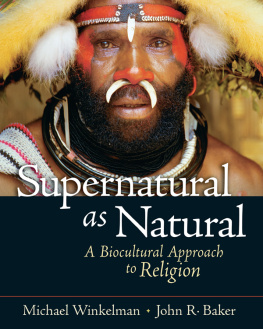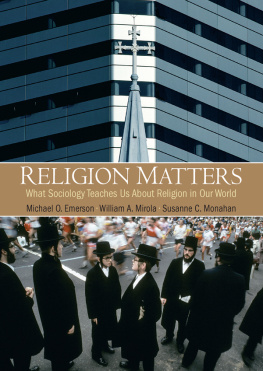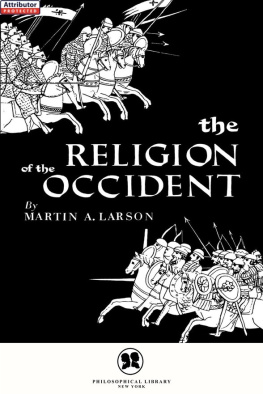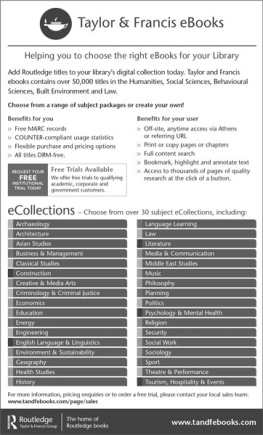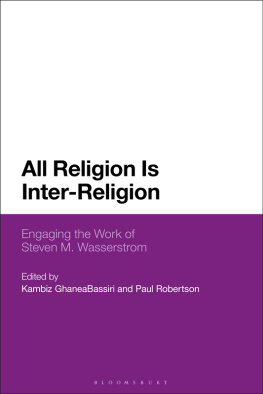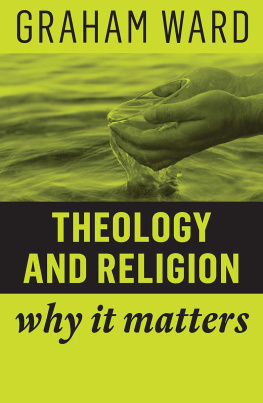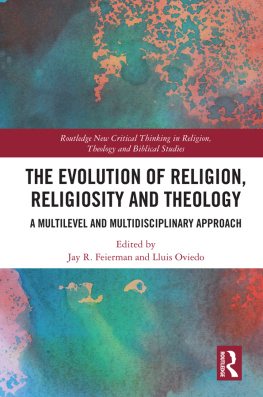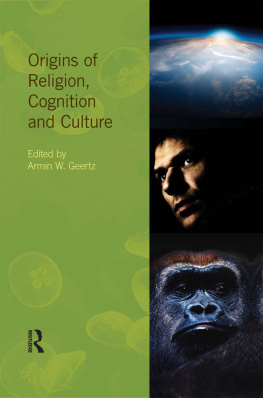SUPERNATURAL AS NATURAL
SUPERNATURAL AS NATURAL
A Biocultural Approach to Religion
Michael Winkelman
Arizona State University
John R. Baker
Moorpark College

First published 2010 by Pearson Education, Inc.
Published 2016 by Routledge
2 Park Square, Milton Park, Abingdon, Oxon OX14 4RN
711 Third Avenue, New York, NY 10017, USA
Routledge is an imprint of the Taylor & Francis Group, an informa business
Copyright 2010 Taylor & Francis. A ll right s reserved .
All rights reserved. No part of this book may be reprinted or reproduced or utilised in any form or by any electronic, mechanical, or other means, now known or hereafter invented, including photocopying and recording, or in any information storage or retri eval system, without permission in writing from the publishers.
Notice:
Product or corporate names may be trademarks or registered trademarks, and are used only for identification and explanation without intent to infringe.
Credits and acknowledgments borrowed from other sources and reproduced, with permission, in this textbook appear on the appropriate page within text.
ISBN: 9780131893030 (pbk)
Cover Designer: Bruce Kenselaar
Library of Congress Cataloging-in-Publication Data
Winkelman, Michael.
Supernatural as natural : a biocultural approach to religion / Michael
Winkelman, John R. Baker.
p. cm.
ISBN-13: 978-0-13-189303-0
ISBN-10: 0-13-189303-3
1. Supernatural. I. Baker, John R, 1953II. Title.
BL100.W56 2010
200dc22
2008039383
To all of our past, present, and future students
and
to our ancestors, who had the wisdom, curiosity, and courage
to ponder their origins and contemplate the meaning of it all.
Brief Contents
Contents
Special Features
For more than a century, leading scientists and scholars have declared that religions were on their way to extinction and that the rational ideas discovered by science would replace the irrational beliefs and superstitions that have been passed down by religion. It was said that this change would usher in a new era of maturity in our species and would represent a significant advance in our knowledge of the Universe, as science provided explanations of a reality vastly larger and perhaps even more strange and mysterious than anything conceived of by any religion.
This shift to secularism and the abandonment of religion has not occurred. Across the globe, religions continue to shape our lives, influence our political decisions, help us recover from illness, define our limits of acceptable behavior, and provide a way for us to distinguish our own group from others. Moreover, the persistence and even reinvention of religion among the peoples of advanced industrial societies suggest that religious beliefs and scientific insights are not incompatible.
Those who predicted the demise of religion may have difficulty understanding why religious beliefs and practices continue to exert such important influences in our world today. In our opinion, the continuing presence and apparently irresistible appeal of religious beliefs and behaviors in cultures across the globe are consequences of some of the most deep-seated aspects of what makes us uniquely human. Religiosity is a product not merely of our cultural traditions, but also of our biological evolution.
For some, looking at religiosity as a product of our biology might seem like mixing oil and water. But humans are biological organisms, and everything we dowhether it concerns the way we move or the things that move usis a product of our evolution. It is not always easy to understand the role that evolution has played in the development of a particular trait or behavior. This is because any characteristic that contributes to the survival and reproductive success of an individualwhether it has to do with religion or with something elsemay be a direct product of natural selection or a by-product that originally served one function but was later used to fulfill another. We can understand how this might occur by considering another virtual universal of human cultures: playing soccer.
Few people would argue that we evolved to play soccer. Our abilities to play soccer are based on many other skillssuch as our ability to walk on two legs, to judge distance, and to kickthat were themselves selected for in the course of human evolution because they helped our ancestors survive and reproduce. Once these abilities became established in the human species, however, they could then be used for other purposes, including soccer, dancing, and a whole host of other activities. Might a similar set of independent abilities account for religion?
Without question, religions make use of many human traitssuch as our ability to relate to and emotionally bond with others, to infer what other people are thinking, to submit to authority, to offer one thing in exchange for something else, and more. All of these complex abilities are the products of millions of years of evolution. But are they enough to explain religion? In other words, is religion nothing more that a byproduct of evolution? Or are there at least some aspects of religion that are the direct products of evolution?
The dominant voices in biology and anthropology have long answered this last question with a resounding No! Religions have been described as quaint cultural traditions, misguided attempts to explain the world, and even parasites that exploit human nature. We do not think that this view is correct, and that is why we have written this book. In it, we will draw together many threads of evidence as we consider why our ancestors came to adopt certain religious beliefs and behaviors. We will consider the evolutionary origins of those traits and assess how these religious features may have helped our ancestors to adapt to the world in which they lived. We will also address whether what may have been adaptive in the past (e.g., as a means of integrating a group and distinguishing it from others) has social effects that have become maladaptive in our modern world. Yet even if some aspects of religiosity are now indeed maladaptive, we cannot easily abandon them. Religions will continue to be a potent force in human life; of that we may be certain. For many reasons, humans are wired for religion.
About this Book: The Biocultural Perspective
The title of this book, Supernatural as Natural, states one of our main theses: Thinking about, and even having an experience of the supernatural is a completely natural thing to do. For many people, the supernatural focus of religion concerns itself with a domain that is somehow above or beyond the natural forces of the Universe. This widespread notion of the otherworldly focus of religious belief systems makes religion seem very different from other, more down-to-earth, aspects of culture, such as economics, family, or politics. But these practical aspects of culture are often shaped by religious beliefs, and they shape religion in return. For example, a religion may instruct its followers to contribute money, goods, and time to a church. Religious myths about the Gods and their families provide role models for how human families should (and should not) behave. And while religion and politics do indeed make strange bedfellows, the two are intimately entwined in most societies of the worldincluding our own.
To many Westerners, the natural is regarded as the domain of science, while the supernatural is the domain of religion. Consequently, many people think that these two domains are mutually exclusive and perhaps even contradictory. But in many other societies, the most important supernatural forces are natural, and the wind, the rain, different species of plants and animals, and even features of the landscape are conceptualized in religious terms and addressed through rituals.
Next page
